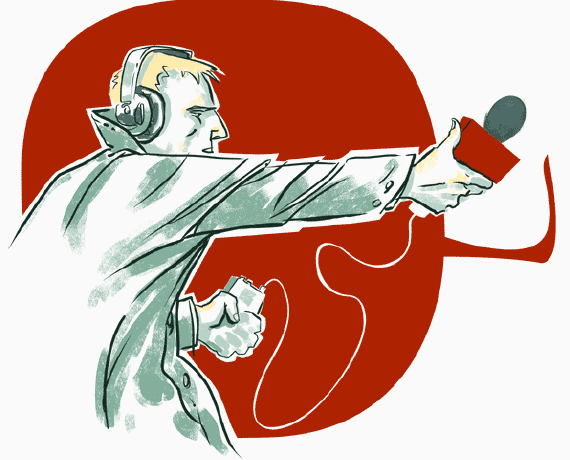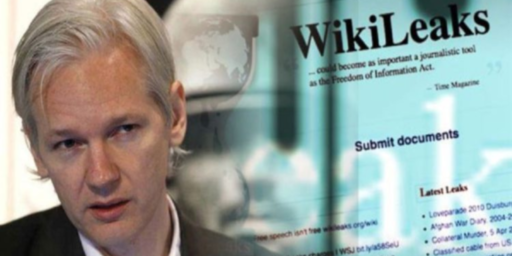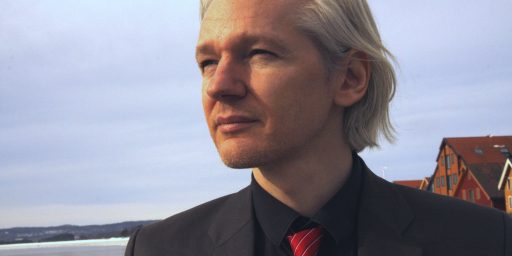WikiLeaks and Journalism’s Future
Has WikiLeaks changed journalism forever?
Aaron Brazell notes, as many have, that it’s amusing to watch the apoplexy aimed at Julian Assange and WikiLeaks for posting stolen classified documents while his co-conspirators in the mainstream press publish them with next to no criticism. But Aaron moves from this to make a more novel argument, namely that Assange is threatening to topple what’s left of the traditional media business model.
[T]he media is on the sideline, their power usurped from this rogue operative with a rogue website. Instead of the New York Times or Washington Post benefitting from the receipt of leaked information as has been the case in their traditional past (see Watergate), an upstart “news organization” is stealing their thunder. Sure the Times and a variety of other media outlets were given the data eventually, but the arbiter of information was no longer them.
While the media wrings their hands over a contrived battle between the morality of publishing leaked, national security documents and preservation of national secrets, the bigger capitalistic battle is happening and that overshadows journalistic sense of responsibility.
The ability to be first is being tainted here. While Wikileaks promises to distribute new information, acting as a benevolent dictator, to news organizations, these news organizations are capitulating their responsibilities simply to make sure they have some crumbs off of Assange’s table.
No one, certainly, is suggesting that news outlets should become a lap-dog, as I have heard toss around, of the government, bowing to their every will and whim. Certainly not, lest we live in a Communist system. However, the media is expected to operate in a suitably responsible way.
In this case, the media knows that they are on the outs. In a last gasp of industry-pride, they have sacrificed themselves in a last-ditch effort to remain relevant. Put in another way, they have come to serve themselves instead of the people they exist to serve.
I’m not sure I agree with either part of this.
WikiLeaks and Newspaper Profits
First, it’s true that the Internet has been killing the old business model based on advertisements in printed copies. And WikiLeaks is to some extent furthering this. But, as it is, WikiLeaks is only important because hundreds of reporters from well established newspapers are sifting through the piles of mostly worthless documents to ferret out what’s interesting and distill it for their readership.
The upshot is that Assange is handing these papers mini-scoops and exciting stories to cover, thus boosting their bottom line. By contrast, I haven’t the foggiest notion of how Assange is making any money off of this.
Now, it’s conceivable that Assange could bypass the Guardian, Times, and others and simply dump them out there for crowdsourcing. Maybe Josh Marshall and the TPM gang or Arianna Huffington’s minions over at HuffPo would do the sorting, instead. But right now, the threat to the mainstream media is minuscule at best.
WikiLeaks and Journalistic Ethics
Is the press here ignoring the real risks of going public with classified documents that could ostensibly cause real harm to their publics? Maybe. Then again, this is hardly the first time. Leaks are the bread and butter of scoop journalism and they have been for some time.
Further, it appears — granted, we have nothing to go on but the publishers’ own accounts of the process — that the newspapers in question actually took the risks seriously, carefully vetting the information before going to press. The NYT, especially, seemed to bend over backwards to get commentary from the US Government and to pass along any objections and their own redactions to other papers who’d received the dumps.
Beyond that, once Assange made the documents publicly available on the Internet, the only thing the editors would have achieved by refusing to report on what was in them was to lose money. Someone was going to report anything of interest.
Turning full circle, I’d also note that there’s an important distinction between the conduct of the newspapers in question and of the WikiLeaks gang: The former didn’t encourage the commission of crimes by those entrusted to protect America’s secrets and set up an elaborate conspiracy to make doing so easier. Yes, they routinely cultivate sources with access to such information and happily abet legitimate whistleblowers. But they’re not out to create anarchy just for the hell of it.




You’re saying Wikileaks encouraged the commission of crimes by those entrusted to protect America’s secrets? Can you explain that? Did you mean “against” instead of “by”?
The people leaking the secrets to Assange are sworn agents of the government.
That seems silly to me. How did Wikileaks encourage the leakers? Did the New York Times encourage the commission of crimes when it published leaks?
If you saw that the US Government was subsidizing a pedophilia ring, wouldn’t you be at least tempted to leak that to force accountability? Can you at least see how someone wouldn’t necessarily need any “encouragement” (whatever that means) to leak the info?
James, you are on the losing side of this argument.
“The former didn’t encourage the commission of crimes by those entrusted to protect America’s secrets and set up an elaborate conspiracy to make doing so easier. Yes, they routinely cultivate sources with access to such information and happily abet legitimate whistleblowers. But they’re not out to create anarchy just for the hell of it.”
What world do you live in? James, do you even read your own words? That is EXACTLY what news sources do. (not their aim, just their result)